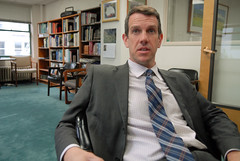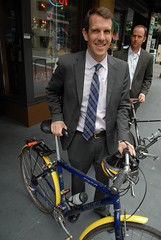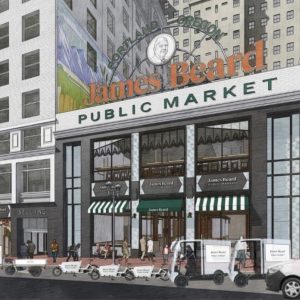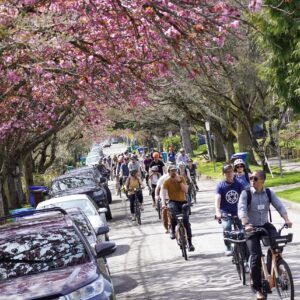James Corless, the Director of Transportation For America — a national coalition of 400 organizations pushing for a new transportation program — is in Portland today. Corless is here to meet with local experts, learn about Portland’s innovations, and share an update on their campaign efforts. I sat down with Corless for a brief interview this morning at the headquarters of 1000 Friends of Oregon in Southwest Portland.
“I’m a big bicycle advocate and got my start… working with the League of American Bicyclists, but I think now we’ve got to work across some of our individual modes and put together a platform that can really capture people’s imagination.”
Why are you visiting Portland?
“We’re hoping to see a draft transportation bill soon in the U.S. Senate. Senator Merkley (D-OR) is on the committee writing the bill and Congressman Defazio (D-OR) is Chair of an important subcommitee in the House. Oregon is a key, key state. What we’re hoping to do is take a lot of very innovative approaches and thinking here and really take them to a national scale. You guys really are a lab, people are looking at you and saying, ‘Well, if Portland is so great than show us the proof’ and ‘How do you scale that to other places?'”
How are bikes faring on the national level in the conversations you’re having about the new transportation bill?
“I think everything is in play right now… I think it was a bump in the 90s when the federal law shifted the first time. It was a very important bump for bicycling and walking. Now there needs to be another shift, because in many ways the public and local governments have caught up and maybe gone beyond the federal government. I think there needs to be a greater emphasis, greater incentives, more direction around things like innovative policies, complete streets, active transportation, health in a transportation context… Transportation professionals typically feel like they’re not in the business of getting people physically active, but they really ought to be.”
Are you concerned that the PBS documentary Beyond Motor City, that’s currently screening around the country, doesn’t mention bicycling as a solution to urban transportation?
“Yeah, sure it concerns me… I noticed that myself.”
My concern is that there’s going to be a jump to the next big thing and we’ll leap to rail and electric vehicles and we’ll skip what I and others think is the best transportation investment for cities — bicycling. Do you think that fear is founded?
“Yes, I definitely think that fear is founded…. We all want to believe there’s a silver bullet and that the next new shiny, often expensive, thing, like high speed rail, that’s seen as, ‘Oh, if we could just have high speed rail everywhere!’ We’re supportive of high speed rail, but that can’t be the answer for everything.
So yes, I think we should all sort of guard against the next shiny new thing that’s seen as the thing to deliver us from transportation chaos. At the same time, what we have to do, and what we’re doing at T4 America for the broader transportation reform community, is to package things together in a way that makes sense.
I think on the bicycling end of things we need to package land use, walkable communities, ITS [Intelligent Transportation Systems], using a lot of technology — whether it’s bike mapping or cell phone technology — we’ve got to package together the package of solutions that is the answer. I’m a big bicycle advocate and got my start writing legislation and working with the League of American Bicyclists, but I think now we’ve got to work across some of our individual modes and put together a platform that can really capture people’s imagination.”
I hear that, but all the signs I’m seeing are that those ‘packages’ are not putting bicycling — the mode with the highest return on investment — front and center. Do you think there’s a reason for that? Is there anything specific T4 America is doing to put bicycling front and center?
“Again, I think what we’re trying to do… This is the tension, the high speed rail people say the same thing to me — ‘Why aren’t you actually making high-speed rail the signature? It’s what captures people’s imagination right now, you ought to have a high speed train going across the top of your website!’…” [Regrettably, I didn’t let Mr. Corless finish his answer and jumped in with my next question prematurely.]
Let’s say, hypothetically, you had a billion dollars to spend and you were in charge of transportation for a city. How would you spend that money?
“What we’re saying at the national level is what I say at the local level, What are we trying to do? What are we trying to create? What are the outcomes we want? We believe we need to triple walking and bicycling; we need to get the rates up to semi-European levels. So what kind of investments do you make to make that happen? That’s partly about infrastructure, partly about land use, partly about social marketing, frankly, and getting Americans to have different attitudes about walking and biking as serious modes of transportation. So, how would I spend that money? It’s hard for me to say what’s the right investment package.”
Can you share a quick snapshot of where things are at on the national level right now?
“The next 12 months is the window. The Senate Environmental Committee is going to release a bill in September… And then whatever happens in the mid-term elections will also be important. We’re trying to tie the oil spill in the Gulf to the need for a new imperative to reduce our reliance on oil in the next transportation bill.”
After our chat, Corless had a meeting with The Oregonian and is currently on a guided bike ride through the city getting an up-close look at our transportation innovations. After that ride, 1000 Friends of Oregon will host a reception for Corless at their downtown offices where he’ll network with local transportation experts and share his perspectives on the national transportation reform movement.









Thanks for reading.
BikePortland has served this community with independent community journalism since 2005. We rely on subscriptions from readers like you to survive. Your financial support is vital in keeping this valuable resource alive and well.
Please subscribe today to strengthen and expand our work.
J,
Thank you for doing the interview and sharing it with us. There seems to be a direction Mr.Corless says the national concenus is pointing, are you saying all concerned bicyclists, and walkers need to contact their lobbists, Senators and Congressmen now?
david,
i’m not advising on any specific course of action that people should take. But yes, I do think everyone that feels biking needs more support at the federal level — and I mean money, not just policy/rhetoric — should call their electeds and let them know.
in my opinion, the reason bikes are still being left at the side of the road while rail and electric cars move quickly ahead, is that politicians don’t see pushing strongly for bikes as an easy political win. Bike projects/funding/issues in America tend to be divisive and partisan in a way that’s unlike any other mode. until that changes, I fear we’ll have to settle for only incremental change instead of the revolution we need.
Man, it sure is hard to get people off their butts and physically moving around. It’s like we could just cut everyones legs off. I also like the idea of reaching “semi-European levels” haha, because we don’t want to totally follow in their well worn path!! Because we are American’s, we are different, we do things our own way and that way means not getting off our butts and driving electric suv’s around town.
RE: “We’ve got to work across some of our individual modes and put together a platform that can really capture people’s imagination.”
Pedal-powered pimped, low-ridin’ gangsta-mobile, anyone?
Hey Jonathan,
I think another consideration for why bicycle infrastructure does not get the support that those other modes get is economics. Building high speed rail and electric vehicles are huge spending endeavors with economic multipliers attached to them in terms of employment and GDP. Bikes and bike lanes, not so much.
All the frame builders in Portland do not exceed the number of operators, ironworkers, and laborers working just on the Broadway Bridge project. I”d expect there’s more steel in a mile of street car rail than every bicycle made in the US in a year.
As long as most Americans measure their quality of life by our per-capita GDP, bicycles are going to be at a disadvantage lobbying for public dollars. The return on investment of bicycle infrastructure to taxpayers is fabulous, but to the special interests that lobby politicians and the politicians themselves that get to hand out the bennies, not so much.
I didn’t find his responses to be very reassuring that T4A is truly committed to the bicycle as a key part of the solution. He’s fairly vague about specifics and doesn’t seem to acknowledge that, while land use, ITS, and multimodal nodes are part of the solution, whta we really need is LOTS more money for top-quality, completely connected bicycle facilities.
That was my feeling too Jessica. Keep in mind, T4 America represents a broad coalition, everyone with their own pet interests… Mr. Corless is not surprisingly very careful to not show he is in favor of one mode over another.
And I’m in absolute 100% agreement with your last sentence. That’s my big frustration right now.